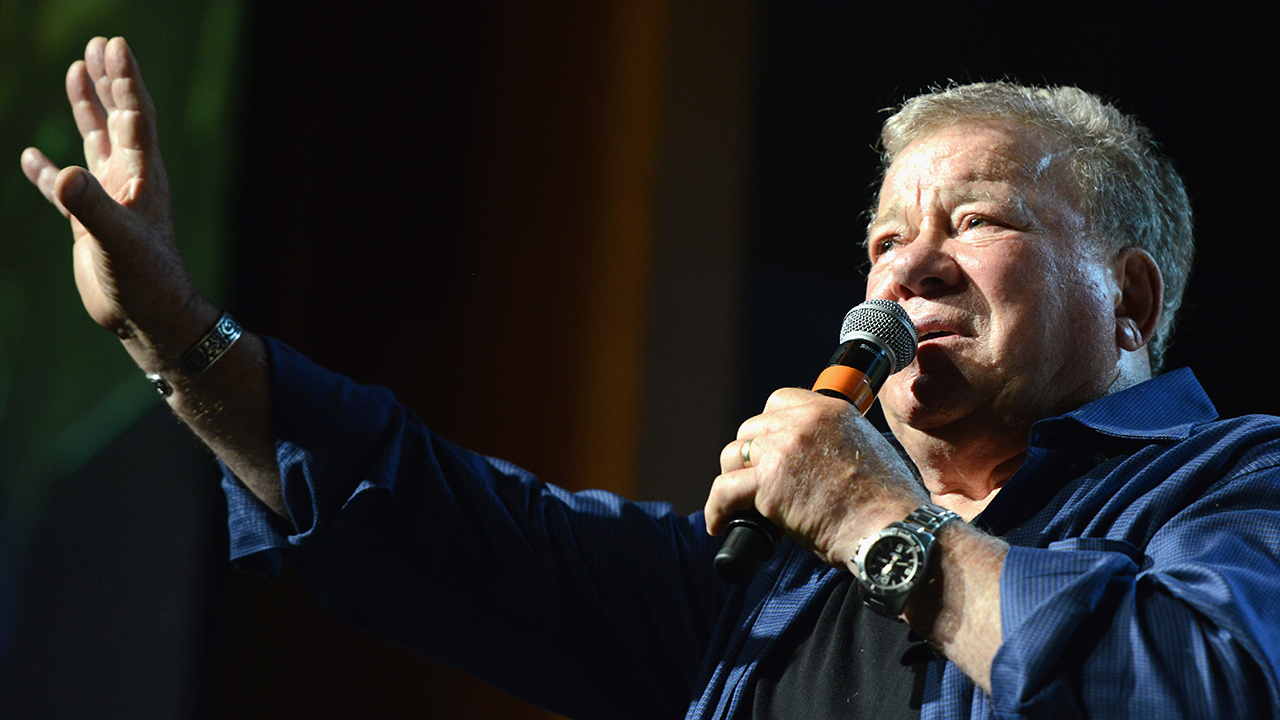“In the 70s, there was more innocence. It was about personal identity, it wasn’t just about money”: how Blondie’s Debbie Harry went from punk icon to rock survivor
In 2011, Blondie’s Debbie Harry sat down with Classic Rock to look back over her stellar career
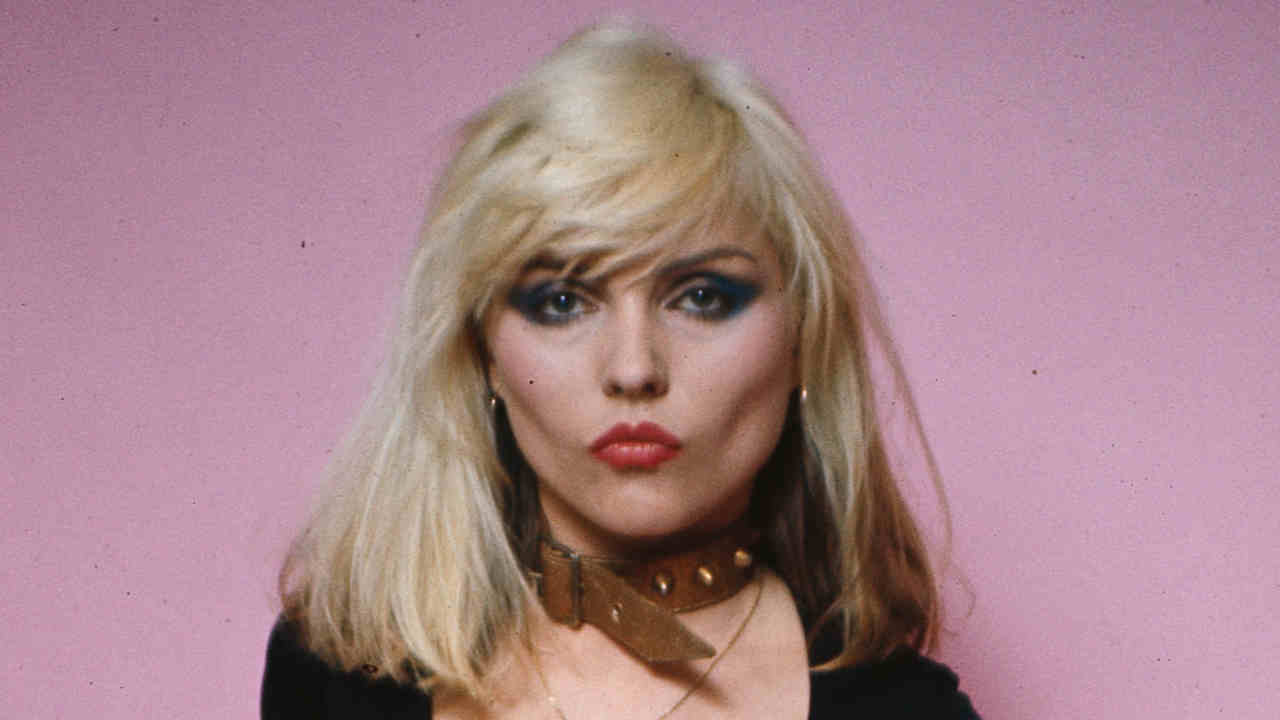
Blondie are one of the most iconic bands to come out of the 70s New York punk scene. Rising at the same time as Ramones, Talking Heads and Television, they swiftly swapped CBGBs for pop stardom, notching up a peerless run of hits, including Hanging On The Telephone, Call Me, One Way Or Another, Heart Of Glass, Atomic and Rapture. They split following 1982, but returned 15 years later with the hit single Maria. In 2011, as they released their second post-reunion album Panic Of Girls, singer Debbie Harry sat down with Classic Rock’s Chris Roberts to look back over her band’s dazzling career.
Debbie Harry is at a Chelsea hotel – not that one, one in London – and the dazzling Spring sunshine makes the sleek boats in the harbour outside the window look like comets, which straight away makes it difficult to avoid lines about “the brightest star”. She’s here for a couple of days, with a gruelling promo schedule that would utterly exhaust you or me but, despite a slight cough, Debbie sails through it like a serene and radiant (if occasionally giggly) yacht. As I’m waiting to go in, a broadsheet journalist sniffs my jacket up close and tells me it smells of wine. I never drink wine, but my honourable colleague has done enough to sow the seeds of unease. Perhaps it is for this reason that upon walking into the room in which Debbie is sitting I throw my jacket onto a faraway chair in a cavalier manner and kiss her hand, although more probably both these gestures are simply the right things to do.
We’re here to talk about Blondie’s ninth studio album, Panic Of Girls, and the band’s sometimes triumphant, sometimes turbulent history. Given that history, it seems odd that it’s only their ninth, but then they did take 17 years’ time out. Theirs is a story that doesn’t fit the shapes legends are supposed to, and yet still somehow conforms to a happy Hollywood-style redemptive arc.
In interview Debbie is always warm, helpful and jovial, though not one to pretend her opinion is anything other than what it is. She prefers chatting to lecturing (“I learned the skill of listening from Andy [Warhol]”). She tends to give polite but concise answers. From previous occasions I’ve learned that the best policy with Debbie is to have a thousand questions ready, or else she’ll ask you some, and nobody wants that. This results today in a thousand questions and a thousand polite, concise answers, but now and again a random pursuit of absurd detours leads to gold. We try our best to cover everything under the sun.
That evening Debbie hosts a launch party at London’s The Ivy, and poses patiently for countless photos, and signs innumerable autographs. Only at the very end of a long day, after signing some fans’ CDs with my biro, does the aura of sainthood drop for a second. An overzealous demand from two girls of “And now can you put a lipstick kiss on our CDs? Both of them? Please?” leads to her shooting me a quick conspiratorial look. It lasts about a twentieth of a second – like a certain frequency to a dog, it’s only discernible to me – but it’s there. The look that lets you know this is a lioness not a kitten. It was always there, all through Blondie’s burst to global fame and onwards. Of course, she grants their request, but only because she’s an entertainer. That fleeting look, though, was always what told you, through the screen or from the posters and even – this is somehow true – on the peerless hit records and supercharged albums, that this was the coolest, most charismatic woman in pop, or rock, or punk, or disco, or whatever. It’s the Queen, bitch.
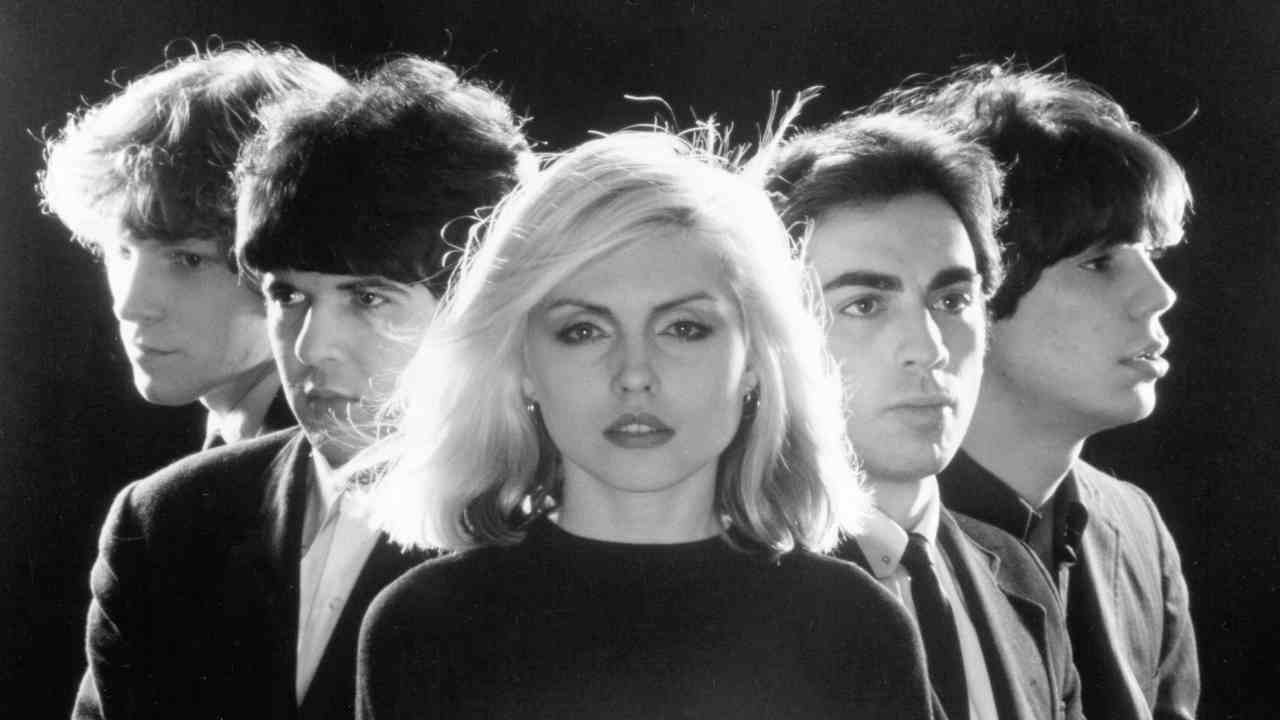
We’re going to talk about the new, the old and as much of the complete picture as we can. In the past you’ve told me you can’t remember everything because so much has happened...
True. So now, well, I try to make it a little... variable. More like I dreamed it was. Not that it’s a pack of lies! Not really...
Sign up below to get the latest from Classic Rock, plus exclusive special offers, direct to your inbox!
So let’s launch in with your summary of the new album, Panic Of Girls.
OK. In a way, I feel it’s a typical Blondie album because it spans a lot of styles and sentiments. It has a light veneer to it but then some depth and some darkness. Personally, I’ve always wanted that. I mean, primarily the music should be entertainment, because it takes people away, and first things first that’s what they want. Then, if there’s a message to it, great, but that’s probably for more private moments. Y’know, when you go out to see a band live you don’t necessarily want to be hit on the head, you want to have a good time. It’s our tradition. That’s what we do. But I think this is a very strong album – it keeps the spirit of Blondie. I’m happy with it. It’s taken us quite a while to get it out – there were moments when we wondered if we would – so I’m glad we’re getting good reactions to it, and to the four or five of the songs we’ve already played live. I have a good feeling about it.
How does the current band shape up?
It’s still me, Chris [Stein, guitarist] and Clem [Burke] at the heart of it... Unfortunately for the rest of them!
Do you fight?
No! Actually, it’s a pretty happy bunch. We all want so much to make it happen. Experience, I guess. Somebody said to me, “Oh, you’ve mellowed.” I don’t know if that’s totally true, but we’re smarter, and more efficient, and better at what we do. And we really want to make it good. We’re real dedicated. The other thing that’s helpful is to us is that we have management that we feel supported by.
Famously, you didn’t always have that...
Aw, we’ve been through some real... But it affects a lot of bands. Life-spans of bands are usually short, relatively speaking, and it can be a struggle. I mean look at all the old bands who never speak. They were great, great bands, and it’s a tragedy. The “ensemble” situation, in all the arts, is always very tenuous, I guess.
I’m always surprised when bands last, not when they split.
Exactly, yes.
Then again Blondie has a unique, rare dynamic, with regard to yours and Chris’ relationship over the years. You’re best friends now, right?
Uh-huh. Well, I hate him. But, y’know, I love him. Ha! I actually do love him. I think he’s a really funny guy. He’s always interesting, always got some great ideas. He’s sort of unstoppable. And Clem’s the same way. Clem is a force of nature. He’s living the dream. He’s achieved everything that he ever wanted.
To be a rock star drummer with great hair?
Don’t forget the cool clothes.
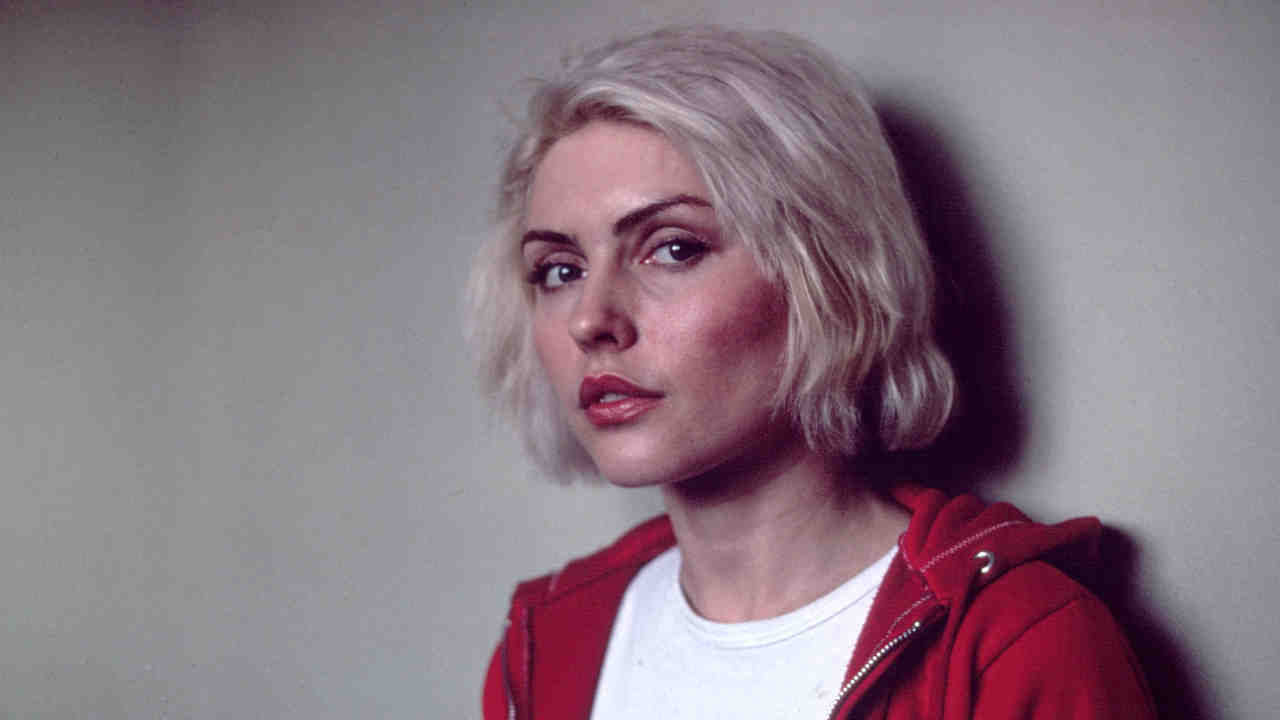
The first time I ever met Debbie Harry was in New York, around the time of her 1989 solo album Def, Dumb And Blonde. I was as star-struck as I’ve ever been, and pretty much told her so. “But it’s like believing in a saint, it’s like mythology,” she said. “Or like looking at a drawing and imagining it means this or this. You envisage it being so wonderful to be like them, but you have no idea what the person or their life is really like. It has nothing to do with reality. I’m just doggin’ around like anybody else. It’s the same deal. I went through all that stuff myself – pop stars were the ultimate people, and had so many good things. Well, some of them do and some of them don’t. Some make good decisions, some bad. If you’re entertained by something and it takes you away and makes you feel good, that’s really what counts, that’s what it’s for, right?”
We all forget things. You’ve neglected to include the title of the new album in the album’s lyrics again, as you did with Parallel Lines [named after a poem Debbie wrote]...
It comes from the song End Of The World, which was written for the album and should definitely emerge at some point – “panic of girls” rhymes with that. A “panic” of girls kinda refers to a “flock” of girls. So a panic of girls is like....woah! [Debbie waves her arms and hands and fingers about, to indicate that’s a whole lot of girls]
So it’s, like, a murder of crows?
Something like that. But also, obviously, it has to do with the panic of girls: girls who are panicking. And I made up these raunchy t-shirts from a line from that Al Pacino film, Cruising, saying “Hips Or Lips”. That’s got something to do with it, too.
Does the artwork explain it better than this?
Isn’t it beautiful? It’s lovely; Chris Berens is a wonderful artist. He works with fantasies. It has to do with the environment, it’s about getting involved with saving all those creatures. I know they’re fantastical creatures but they’re evocative of real animals. Everybody in the band is concerned about environmental issues, saving these species. In one of the songs I have a line equating the human race with an endangered species. So ultimately that’s where we’re going with that.
Was it an easy or difficult album to make?
Chris and I had a great time writing, and he was very prolific. And Matt, our new keyboard player who’s been with us for a couple of years, is a very energetic writer. We recorded in upstate New York in winter, where Chris lives, as well as recording in New York and Hoboken. It was an extreme snow situation, quite picturesque. We got busy, worked hard. And I made my small contribution here and there. Well, lyrically I always add a lot. This time I actually came up with some songs. While I was doing the solo album, Necessary Evil, I started working with different co-writers and producers. They call themselves Super Buddha. So I had a bunch of songs this time.
There’s always a mash-up of writers on Blondie albums, with you and Chris usually writing 50 or 60%.
We started that way, I guess, so it’s what we and other people expect and feel right with. I think it’s given us an added power, really. A width. It’s similar people playing similar instruments, so it sounds like us.
Is it fair to say there are more hints or glimpses of autobiography than usual?
More personal things? Perhaps, yeah. Well there usually are, but this time more obviously so, I guess.
It’s some autobiography, and we can handle a few more hints and glimpses. Let’s go back to Blondie’s beginnings. Do the three of you ever recall the early days, starting out with a fascination for sci-fi, b-movies and pop-trash culture and a crazy collective dream?
It started out with comic-books, actually. Everyone had a tremendous relationship with comic books and art. It’s been a lasting tradition of ours. It was just something that we noticed, and which we all shared an appreciation of and fondness for. So when you’re looking for similarities and reasons why you should share some camaraderie... You’re desperate to cling to something, I guess! These things come up. It could have been anything. It could have been French movies. It could have been...I don’t know...geography. Anything! Talking Heads all bonded because of their hobbies...
Do you remember much from the CBGB days?
Yeah, it’ll give me a headache though. Just kidding. Of course at this stage of the game I remember it with both affection and regret, and I wish... I think... When the World Trade Center went down, there were a couple of weeks where I went through different stages of feeling, like anger, then fear, then a feeling of being lost, and then mourning. And then a couple of weeks further along into this process I had a surge of, oh God, wishing it was the 70s again. Because it was such a great time. Even though it was a complete struggle and we had no money, it was a great energy. We were... climbing. And discovering. And what could be better than that? I think a lot of people enjoy being at the top and having great success and all. And I can’t really say I don’t enjoy that. But all that treasure of making it happen... It was just a great, fertile period. Also I think, in the 70s, there was more innocence about it. It really was about personal identity, it wasn’t just about money.
You mean that people then made records which expressed who they were?
Well, we might have done, but nobody knew who the fuck we were, or could give a flying one. There was very little contention, other than wanting to be better than the other guy. It wasn’t about getting signed, at that point; when we started, there simply wasn’t anybody interested. New York is always happening though, in any era. It was always competitive, yeah. But it wasn’t like we were all hating one another. [“It was such a wonderful time,” Debbie told me in 2003. “It was formative for me. I gave it a lot and it gave me a lot back. You learn, you move on. I was lucky.”]
Things eventually happened for you, but not, as is sometimes stated in error, overnight...
Yeah it just worked out nicely for us all, all the bands. The fact is that everybody grew and got momentum and colour and interest. The Ramones, Patti Smith, Television, Talking Heads. So people were now going, oh wow, let’s record this... I mean, everybody, including us, had wanted to record. When you start up a rock band, you envision yourself being David Bowie or The Doors or Pink Floyd or, y’know, whoever’s the biggest thing in the world at the time. Like, why else would you do it? We always had a lot of passion for what we did.
When it all went supernova with Parallel Lines, was it an enjoyable whirlwind or a terrifying one? Chris has in the past likened it to being “strapped to the nose of a torpedo”...
Yeah, that had a lot to do with poor management really. Sharks. There was that element of: we’re doing huge things for the first time without a guidebook. We got a really good push from Chrysalis. But none of us had any experience.
Was that landmark album fun to record, or fractious?
There was a certain amount of competition within the band by now, never mind outside it. Who was writing what songs, et cetera. I’m not gonna point fingers at anybody, because at the same time, strangely, we all really stood up for another too. I guess we were sorta like brothers and sisters: there were healthy rivalries in a way. I wasn’t going to be anybody’s victim, and I wanted to do what I did on my terms. I was a stubborn, strong woman, but as vulnerable a human being as anyone else.
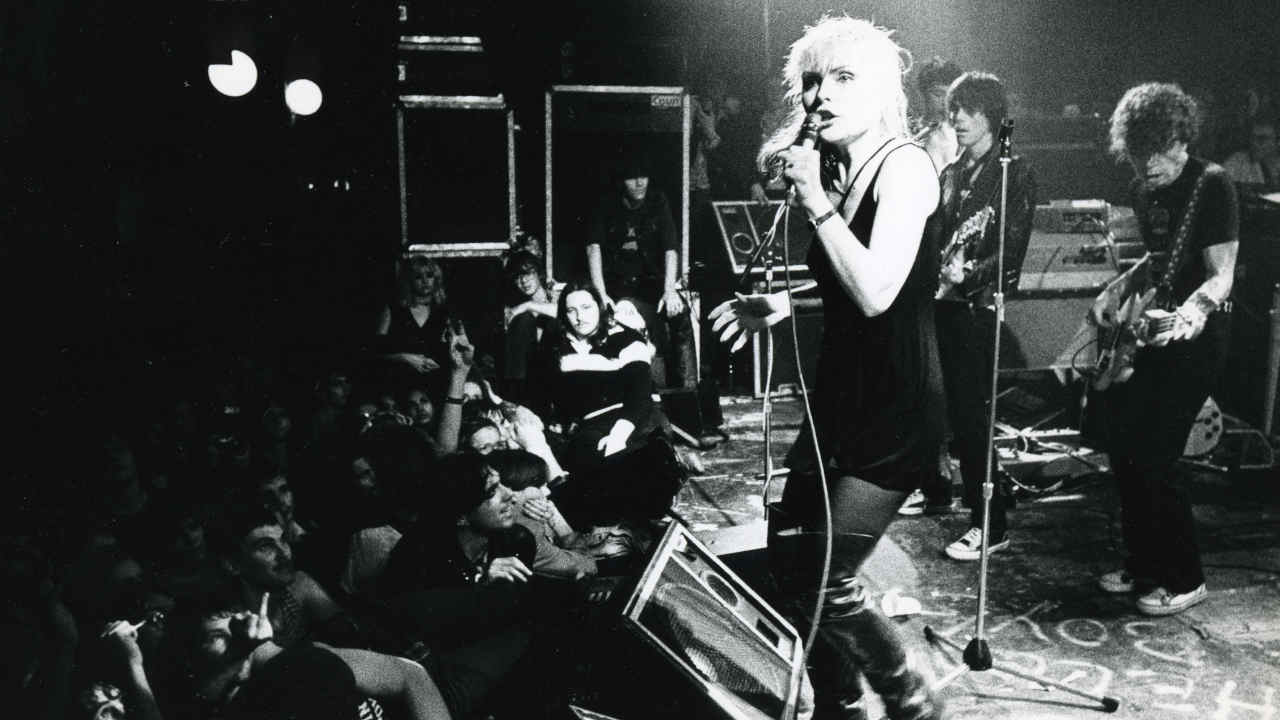
Debbie told me once: “I don’t know that I was really trying to do anything, except learn how to do what I do. The essence of Punk Rock lingers on; people have a great fondness for the music, but maybe not everyone’s aware of the historic importance of the changes that occurred around then. I mean, you had the Women’s Lib movement and Gay Lib... That’s two pretty major sexual revolutions that happened in quick succession. I don’t know if I was subversive, if I was that in control of everything, but I know I was searching, trying to express myself, to discover where I fitted in with all this. It was pretty confusing, then, to be a woman or girl in front of a band.
“A lot of people hated it,” Debbie continued. “It was seen as... not right. I looked up to Janis Joplin and Grace Slick, and English girls in bands, but it wasn’t until it became commercially viable that lots of girls went: hey, I can do that! And the record companies were willing to run with them. Let’s say I was an idea whose time had come. It was inevitable.”
“Anonymity is a nice thing”, she said to me on another occasion, ”but I mean – it’s not my job. Being a girl singer during the punk era was a funny thing, an odd position to take. Since I was a front for a bunch of guys, it was like some of their perspective came through me, so I couldn’t be ‘real cute’. I WAS cute, but I had to be tough too. So that helped me in a way. It made me become... schizophrenic! Ha ha ha!”
“At times,” she continues today, “Blondie was a totally focussed thing. I do think that if we’d had, say, Gary Kurfurst as a manager – who I worked with later on – he would have been terrific. He knew what he was doing, and was great for Talking Heads and Ramones and others. He had great ideas. The guy we had, it did not turn out well.”
You should have made a lot more money from your hits...
Yeah, we had bad deals and he was responsible, set us up poorly, made it difficult. I honestly don’t want his little name mentioned actually.
The UK gave Blondie your first successes, embraced you first. America was slow to ‘get it’. Why was that?
Pop was established here, and we were – in the main – a pop band. Even though we thought we were underground, alternative, subterranean. Our subject matter was sometimes macabre and dark, but we had a pop sensibility. And pop really hadn’t quite re-emerged in the States at that point. Also, it seemed very natural here.
Heart Of Glass was the great all-conquering unifier. It’s comical now to think there were Punk Vs. Disco wars, with factions bearing placards like “Disco Sucks”. Now, in our enlightened age, we know both were great.
Ha ha, yeah it was a “crossover” thing for us, when nobody was then used to “crossover”. It hadn’t really started. Clearly, Heart Of Glass was a “crossover”. Rapture, too, then became one. And The Tide Is High – although you guys here already had the reggae thing, but it hadn’t really been delivered in the States till Chris heard it in the UK and got into it.
Your tastes were affected by late nights at Studio 54, basking in disco-inferno fever?
Yeah – we were such an urban band. And Chris and I were such terrific fans of Chic, and Donna Summer and Giorgio Moroder. As you know, later we worked with Giorgio on Call Me, and with Nile and Bernard of Chic on Koo-Koo. The techno thing entered our picture, with Jimmy [Destri, keyboard player] playing synthesisers. It seemed like a natural evolution for us. We were “graduating” towards new instruments. And then we were in the studio, and we’d had this song, Heart Of Glass, under various names for over five years. It just sat there and we never used it properly. We’d tried and tried, translated that song so many ways and it never really worked. Chris and Jimmy were always going over to 47th Street where all the music stores were, and one day they came back with this little rhythm box, which went “tikka tikka tikka”... And the rest is history! That was the beginning of the song as you know it. It just blew up. We all went, “Yeah! That really works!” It sorta drove Clem crazy, and he may have a different recollection, but... It’s such a short trip, what the hell, heh heh.
With Rapture you brought rap and hip-hop to the mainstream. Which is a huge deal.
Yeah – recently somebody from [hip hop duo] Mobb Deep said that was the first rap song that they ever heard. Which was really shocking to me, because those guys are intense.
You always shrug and downplay it in conversation, as if Rapture wasn’t the paradigm-shifting game-changer it really was...
Yeah... Oh... Do I?
Do you think you’re more modest, or less self-aggrandising, than a lot of big stars, because it didn’t happen for you until you were relatively mature, in pop terms? You once said you were “more famous than I was successful”...
I wonder about that actually. I don’t know if it’s to my detriment... I mean, I love the idea of incredible self-confidence and bravado and all that: I think it’s really great to have that. Maybe I... I don’t know why I’m like I am. I guess... I’m a realist, I guess.
You don’t go around like many divas shouting: “I’m the queen, the queen of it all”. Sorry, I don’t know why I went into a strange King Kong voice there.
I am the queen... [She adopts a similar, strange King Kong voice] The big, big queen. Yeah. About six foot eight. VERY big. No I liked the voice thing actually.
Your voice sounds better than ever on Panic Of Girls. It’s strange to think you once got slated as a singer.
Thanks. Ha! Practice, y’know? I admire quite a lot of singers and I’ve learned from listening. I think the level, the calibre, of singers and musicians has gone up a lot over the years, don’t you?
I guess, technically. But many sound too perfect, like machines, only not in a good way. I like a touch of humanity now and again, as long as it’s not bawling all over you.
Oh, the clean-up thing, the technical end of it, sure. But in a live situation you can always tell who has a quality, a honey tone, a beautiful timbre. I do think I’ve got better. I hope so – I mean, that’s one of the satisfactions of doing it for all this time. It does get better and you learn things.
What’s your secret? Is yours a healthy lifestyle nowadays?
I try. I mean, I don’t really drink much: drinking’s never been a problem of mine. I have minimal tolerance for most things. And I do exercise a lot. Rosehip tea, I like. With honey in it. I make it really dark, like syrup almost. I drink it onstage. That’s what’s in my little cup – nothing more outrageous! Actually, Elvis Costello turned me on to that, when we were doing some jazz shows together. I can vocally vamp on a groove now. I’d like to get into that more, although sometimes I feel it’s something that people overdo. You know, all the woo-hoo-oohs and the scales, that gets strange sometimes.
You mean like Celine, and Whitney, and American Idol-types, and Christina...
Oh, Christina Aguilera is a really truly great gifted person who can do that. I don’t know if I’m that gifted. But I think in some places, it can really work...
And yet Blondie has in many ways been all about no frills or sentiment, straight, clean lines, directness...
Musically, perhaps. Not lyrically!
Yeah, Blondie are weird and twisted lyrically...the bubbly surface with its dark undercurrents...
Woo! Yeah! [Her face lights up even more than it’s normally lit up] Twisted – I like that. Heh heh. Definitely.
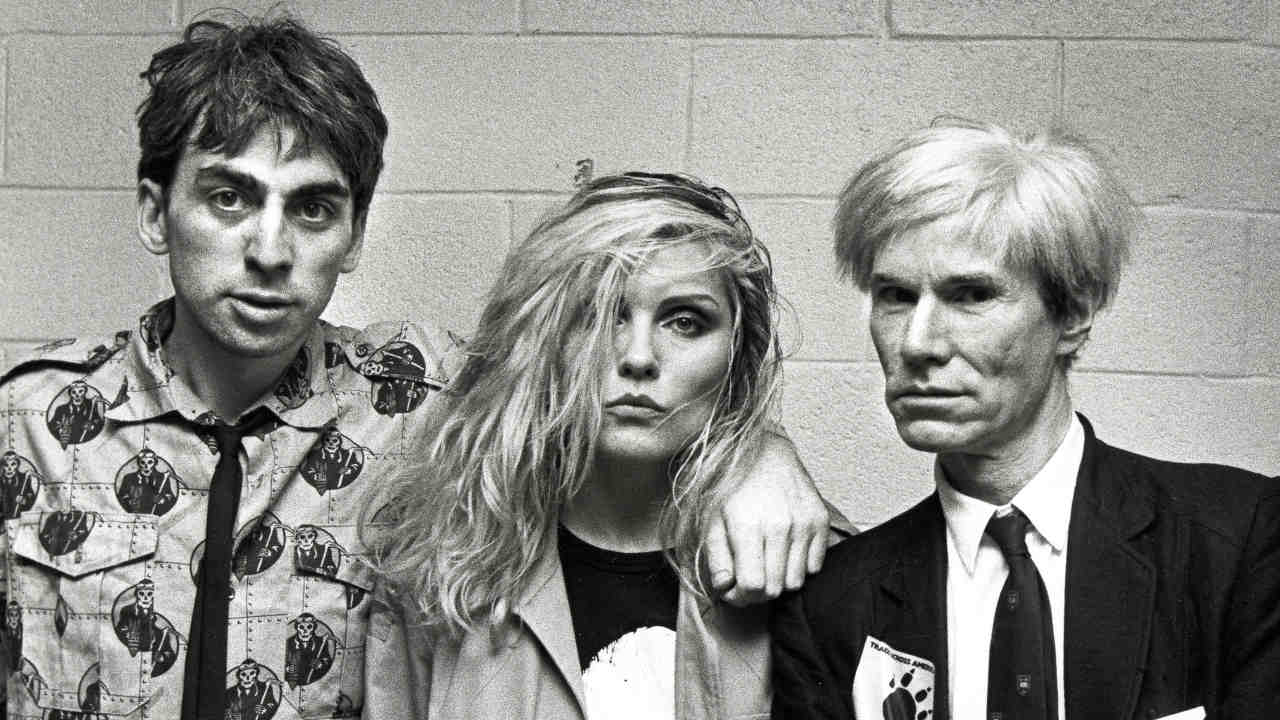
You were the bright clean straight lines Marilyn of Warhol’s later years. It was so very right that he made images of you, immortalising your face as a Pop Art icon. [I once told Debbie that he’d named her as his favourite pop star (I’d read), and she laughed, “Was I? I’m my favourite pop star.”]
Well he basically did two. Plenty of photos, sure. I’ve seen two that he actually reproduced on canvas, but pretty much from the same photo session, just a slightly different angle.
Did you get on well with him?
Yeah, we did get along. It’s maybe been just a little overblown over the years. Early on I was very fascinated by and in awe of Andy and his entourage. He had all his Factory Superstars and invented all that, and was making his films. And that was when I was just an observer, basically, a “newie” into New York City. All of that was already going on. Then later on I got to meet some of those people, and to meet Andy. Then we started doing Blondie. But after he’d been shot I think it changed his way of life. He still was extremely active; he had a huge social life. He was very curious about everything and went out every single night. We’d go to a lot of different places. He was a great listener and I tried to learn that from him. He had tremendous energy, because then he’d get up in the morning and go to work and do stuff all day long. He was truly amazing in that he was a Renaissance kinda guy. I don’t know if he was the first but he certainly took “Pop Art” seriously and brought in different media into his art forms. Which was instrumental in shaping today’s world.
And at least a sprinkling of Pop Art awareness informs Blondie’s work, carries the torch...
Sure, Chris was an art student, Jimmy was interested... We all had a smattering of an art background. New York was very much like that then. All the different people – artists, photographers, film-makers, musicians – influenced each other and socialised together. I think they still do. I imagine it’s pretty much the same in London. People overlap and cross-fertilise. It’s nice.
So: if your life was a three-act screenplay, we get to the latter part of the second act, where fortunes slide, and the biggest pop group in the world split after 1982’s The Hunter. And troubles, of every stripe – health, finance, personal, professional – set in. What the hell was happening there?
Well, our business fell apart. We had some bad tax problems. Our deal ended, and we had no record label. The group disbanded. Chris was very ill. Just... [blows raspberry]Everything went... ppfffftt. It fell apart. I did some solo albums during that period; Chris contributed heavily to those.
Your solo albums were underrated, especially Koo Koo and Def, Dumb & Blonde...
So anyway [shrugs], they never really happened, those albums, but I thought they were good. They sorta kept us going.
The Koo Koo sleeve by HR Giger was another in the succession of brilliant cover shots...
“Yes, and we did some filming with him. Chris shot a lot of stills during that period, he’ll give you some I’m sure. We’re aiming to put a book out of his work; his photography is really sensationally good.
It’s clear Debbie doesn’t especially want to mull too much over “the fallow years”, so we move to the third-act “comeback”. Everything came right in the late Nineties, when No Exit announced Blondie’s warmly-embraced re-entry. They got their shit together, and unconfined joy spread across the territories. “Nobody can say we didn’t stick around for 15 minutes”, winked the t-shirts.
“Somebody was talking to Chris about it, not for the first time, and said to him, ‘Look, if you don’t do it now you’re never going to do it,’” Debbie says. “That was right ahead, straight on the money. So he called me up and said, ‘What do you think about putting Blondie back together?’ And I laughed! Then he went on, and called everybody, the guys. Nigel also laughed. Jimmy and Clem, I guess, were for it. So Chris called me back and was very persuasive. So I said, well OK, y’know, we’ll give it a try. We were out in LA, I don’t know why, and we got together in a little rehearsal room and played and – it really sounded like us. Still. And that’s what convinced me. It sounded like Blondie.”
Were you surprised when Maria swept to No.1? Was it too ‘fairy-tale’ good to be true?
Honestly? It’s not my favourite song. It’s a little too retro, for me. I’d have preferred something a little more of the period, more current. But it’s a good, pretty song; it develops nicely. And audiences loved it, so...the sense of approval was fabulous.
It served notice: it nudged people and said, ‘remember how great Blondie were?’
Yeah... I think that was the message that the record company was going for.
A lot of comebacks fizzle out...
Yeah, so, it worked. Lucky break!
We must talk about the Blondie videos, a peerless archive of stellar, deathless pop moments. When you made Eat To The Beat’s “track-by-track visual accompaniment”, nothing of the ilk had ever been attempted. It was years ahead of its time, of MTV et al. Now such strategies are de rigeur, of course. But then, even though some narrow-thinkers dismissed it as “hype”, it was explosive...
First time, yeah. I enjoyed shooting those. It was a lot of work. The director was great, calm yet energetic. He made it easier for us. I mean – we had sorta grown up doing videos as a band. Since we were American and had such a big thing going on here [in the UK] we really had to prepare videos – had to – because certain songs would break, here or in, say, Australia, and we couldn’t necessarily be there. So videos were a big part of what we did from early on. I think the first we did were for X-Offender and In The Flesh...
You did Desert Island Discs yesterday. What discs did you choose?
Yeah – how difficult was that?!? You can’t pick all your favourites, only eight. Eight songs! I mean – good God – eight?? C’mon! So, what did I pick? Velvet Underground’s White Light/White Heat. I gave The Gossip a nudge. I gave Peaches a nudge. I put in a couple of symphonic pieces, one from Nino Rota, one from Mahler. Oh, and a Fever Ray song, I like them. It’s quite a modern selection overall. I mean, if I’m on a desert island I can sing the oldies to myself, so....! [Later, Debbie also declares a liking for Jay-Z and Alicia Keys’ New York anthem Empire State Of Mind, Eminem and Rihanna’s Love The Way You Lie, Muse’s Supermassive Black Hole and, somewhat unsurprisingly, Donna Summer’s I Feel Love.]
You’ve taken to performing Bowie’s Heroes again in recent shows. [Blondie’s original 1980 live version, with Robert Fripp on guitar, constituted the b-side of the Atomic 12” single, and remains one of the most invigorating live tracks ever released.]
Oh yes, this past year or so. We all enjoy that it’s come out so well. And it seems apropos. When we started doing it again there were all these international crises and conflicts going on; the audience seem to appreciate it and sing along wherever you are in the world.
You’ve also taken to covering Taio Cruz’s Break Your Heart...?
Great song.
Will you want to do this forever?
“I can’t imagine retiring. I want to keep on doing things, of course. I feel OK, pretty good, about what I’ve achieved, and I don’t want to stop. But I’m aware I can’t be fronting a pop band or rock band and performing forever, sure, even if I’d like to…”
Why not?
“Well, nobody lives forever, right? Mortality and the rest?”
So what’s your philosophy regarding mortality and all that?
“I just want to make this life as good as it possibly can be. Don’t we all?”
What would you do instead of singing?
“I like to write, I’ll keep writing. And I’m interested in style, fashion: maybe I could start a clothing line…”
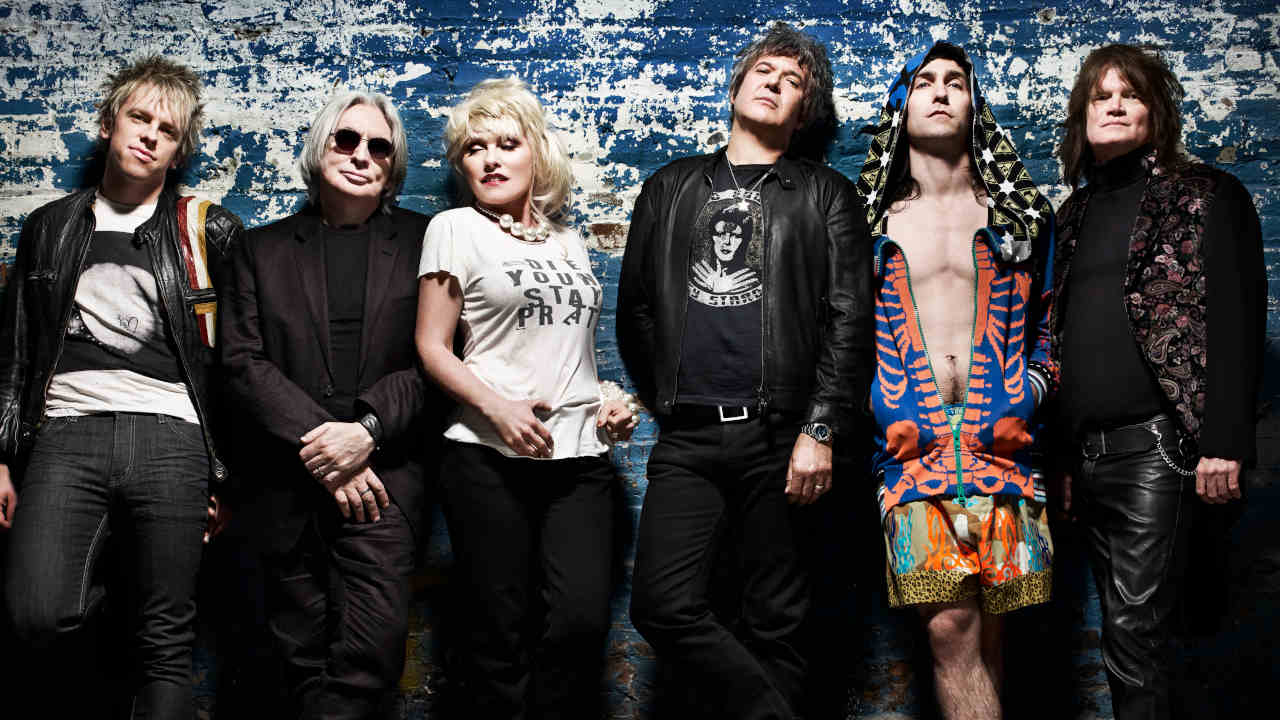
Today, Debbie also discloses that Blondie have toured for something like three to five months every year for the last few years “so we must like it. The travelling can get boring, and you’re stuck between soundchecks and hotels so you don’t have time to go see the waterfall or museum or whatever the hell it is. Performing is the pay- off though.”
The PR tells us, not for the first time, that our time is up, and Debbie sighs with customary self-deprecation that she’d “better go and do my transformation” for the next photo shoot. We decide to race through some quickfire points first.
Been in any good films lately?
Not for a while, but I’d still like to do some. We’ll see.
Favourite film you’ve been in?
It’s between Videodrome and Hairspray, because I really had characters there. A lot of things have been cameos, little short chops. But those two were real parts.
Favourite photograph of yourself?
Too hard to choose. Better not do this one, I’ll accidentally offend someone. I hung out with [photographer] Brian Aris last night, he’s done some beautiful ones. I like lots of Chris’s, obviously.
Is it true that you keep a collection of strange, memorable fan-made art that’s been given to you over the years?
Yes. I don’t know if it’s so strange though; it’s sweet. I don’t know why people think it’s strange, unless maybe it’s strange that I save it? But it’s a treasure for me. It’s like a scrapbook.
Optimistic for the future?
I’m pretty much an optimistic person, yes.
I once asked Debbie what made her tingle (in fairness, she’d been talking about the Blondie track The Tingler) and she listed Marilyn Monroe, music, painting and her collection of James Dean photographs.
“And realising that I’ve survived a lot of really extraordinary things that have happened to me. We survived. I survived. Blondie survived.”
And always will.
Chris Roberts has written about music, films, and art for innumerable outlets. His new book The Velvet Underground is out April 4. He has also published books on Lou Reed, Elton John, the Gothic arts, Talk Talk, Kate Moss, Scarlett Johansson, Abba, Tom Jones and others. Among his interviewees over the years have been David Bowie, Iggy Pop, Patti Smith, Debbie Harry, Bryan Ferry, Al Green, Tom Waits & Lou Reed. Born in North Wales, he lives in London.




